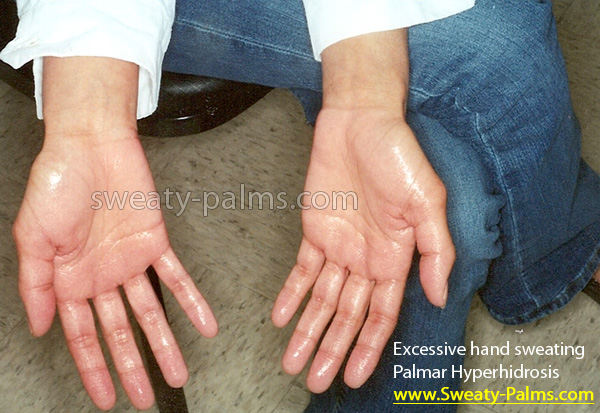Recognizing Excessive Sweating: Dermatology Insights on How to Stop Sweaty Hands
Recognizing Excessive Sweating: Dermatology Insights on How to Stop Sweaty Hands
Blog Article
Recognizing the Source of Excessive Sweating and Its Effect On Day-to-day Live
Too much sweating, also called hyperhidrosis, is a problem that influences a significant part of the populace, yet its underlying causes and implications on daily functioning continue to be rather enigmatic. While it is commonly comprehended as a physiological reaction to control body temperature level, the triggers for excessive sweating can vary extensively amongst people, including not just physical variables however additionally emotional and psychological elements. In addition, the influence of this problem extends beyond plain pain, often affecting social communications and overall top quality of life. By diving right into the source of hyperhidrosis and exploring its diverse effects, a deeper understanding of this pervasive problem can be acquired, clarifying the intricacies that individuals grappling with excessive sweating browse every day.
Physiology of Sweat Glands
The guideline of sweat manufacturing, a vital physical process, is mainly managed by the activity of gland dispersed throughout the human body. Gland are categorized into two major types: eccrine and apocrine glands. Eccrine glands are the most numerous and are found in almost all locations of the body. They play an important role in thermoregulation by producing a watery fluid onto the skin's surface area, which vaporizes and aids cool the body down. In contrast, apocrine glands are concentrated in areas abundant in hair follicles, such as the armpits and groin, and their secretions are thicker and milklike in appearance.
When the body temperature level climbs, either due to exercise, high temperatures, or psychological stress and anxiety, the nerve system triggers the gland to generate sweat. This sweat is made up primarily of water and electrolytes like sodium and chloride. The procedure of sweat manufacturing is vital for keeping the body's inner temperature level within a narrow, ideal array, highlighting the critical function gland play in human physiology.
Triggers for Excessive Sweating
In comprehending the root creates of too much sweating, it is critical to identify the triggers that can lead to this physical feedback. Physical physical effort, high temperature levels, and spicy foods are also understood to cause too much sweating in people prone to this condition.
Furthermore, medications such as some antidepressants, opioids, and specific supplements can also function as triggers for hyperhidrosis. Recognizing these triggers is vital in taking care of extreme sweating effectively - Exessive Sweating. By recognizing and attending to the particular triggers that prompt excessive sweating in a specific, medical care companies can develop tailored treatment strategies to ease this condition and enhance the person's high quality of life
Medical Issue Associated
Linked with extreme sweating are different clinical problems that can aggravate this physiological reaction. One common condition is hyperhidrosis, a disorder identified by extraordinarily raised sweating that exceeds the body's thermoregulatory demands. This can materialize in focal locations like the palms, soles, underarms, or face, influencing an individual's lifestyle due to social embarrassment and pain.
Moreover, endocrine conditions such as hyperthyroidism, read this post here diabetic issues, and menopausal warm flashes can likewise lead to too much sweating. Hyperthyroidism creates an overflow of thyroid hormones, speeding up metabolic rate and setting off sweating.
In addition, infections like tuberculosis, endocarditis, and hiv have actually been connected with night sweats, a typical symptom known to interrupt sleep and influence overall well-being. These medical conditions highlight the diverse variety of underlying elements that can add to too much sweating, necessitating extensive examination and administration by medical care specialists.
Emotional and emotional Variables

Effect On Social Communications
Too much sweating can have profound results on an individual's ability to engage comfortably in social interactions. The noticeable indications of sweat stains or damp patches on clothes can bring about embarrassment and self-consciousness, creating people to take out from social circumstances. This withdrawal can impact partnerships, limitation social tasks, and hinder expert and individual growth.

Furthermore, the anxiousness and self-worth problems stemming from excessive sweating can influence interaction and social skills. Individuals may battle to concentrate on conversations, take part in team tasks, or express themselves confidently. This can result in sensations of seclusion and isolation, as social connections become testing to maintain.
Final Thought

While it is frequently comprehended as a physical reaction to regulate body temperature level, the triggers for excessive sweating can differ commonly amongst people, including not only physical variables yet mental and additionally psychological elements. By diving right into the root causes of hyperhidrosis and exploring its multifaceted impacts, a much deeper understanding of this pervasive concern can be acquired, dropping light on the complexities that people grappling with excessive sweating navigate on an everyday basis.
Physical exertion, high visit this page temperatures, and spicy foods are also known to trigger excessive sweating in people prone to this problem. By determining and addressing the particular triggers that motivate excessive sweating in an individual, medical care carriers can establish tailored treatment strategies to relieve this problem and enhance the person's top quality of life.
Excessive sweating can have extensive effects on an individual's ability to involve conveniently in social communications.
Report this page